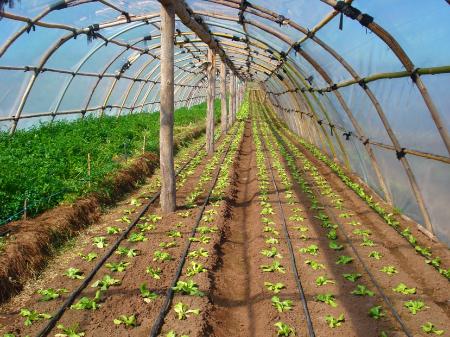“The future of food security on the current trajectory is a road to nowhere, and to repeat the statistics that we need to grow 50-70% more food without answering the questions, on what land, with which water and with what kind of seed diversity, is a discussion that merits much greater attention,” said Achim Steiner, the United Nations Environment Programme Executive Director recently in Brussels.
He stressed that an ‘Ecosystems approach’ to water and food security may allow us, as a global economy, to produce and manage food without depleting the very resources that we rely upon for food production.
In earlier Voices & Views on capacity4dev.eu this year, agriculture specialists have shared their views on how our planet will be able to support food production for the projected population of 9 billion people by 2050. European Commission policy currently places emphasis on sustainable agriculture, and food and nutrition security, drawing in resilience measures. Agro ecology and conservation agriculture is part of this.
Yet, in the scramble to be part of the global agricultural economy, the common-sense underlying principle of working with and protecting nature's assets seems widely to have been forgotten. In the last 150 years, farming has, to a large extent, become an extractive industry.
“It is not operating as a sustainable farming operation – we’re seeing desalination becoming a problem as a result of irrigated agriculture. We’re seeing soil fertility going down, we are seeing soil degradation and desertification,“ said Achim Steiner, who was recently in Brussels to meet with Commissioners regarding sustainability issues. “We are actually contracting the amount of arable land available to grow food at a time when we are supposed to be thinking about how 9 billion people will be fed.“
UNEP strongly advocates an ‘Ecosystems approach’ for future agricultural strategy, based on the notion of working with nature rather than trying to replace it in agriculture with modern chemistry. Value for the environment is proposed not only in production, but throughout agricultural extension services by, for example, facilitating access high value markets for organic farmers. It also involves a better deal for consumers through the promotion of transparency in certification and labelling and, over time, lower prices for organic produce.
Starting on the land, the Ecosystems approach looks at the live system within which a farmer is producing. “This approach essentially tries to bring agriculture more ‘in sync’ with maintaining soil fertility, recognising the limitation of ground water resources, dealing also with biodiversity, pollinators … ,” explained Steiner. Nature's own under-utilised methods to significantly increase yields are then brought into play.
A 2008 UNEP and United Nations Conference on Trade and Development (UNCTAD) report on organic farming in Africa shows that organic farming intensification can provide between 80 and 100% increase in yields, with far less dependence on expensive inputs, and also using what a farmer has available in their local economy - for instance, trees and Agroforestry.
“It’s always striking to me how little we have still in the modern farming economy integrated trees into the management of farming systems,” said Steiner, “It’s part of carbon capture, it’s part of soil fertility. In Africa there is an acacia tree that is called the Fertiliser Tree that has nitrogen fixing functions.”
In the next stage, the Ecosystems approach links nature, science and natural resources to economics and markets. “It also is to create markets, which capture the true cost of production and the true benefits,” he continued.
While working with nature may be essential for long-term food sustainability, it is also timely for consumers. After a spate of food related health scares and scandals, consumers are increasingly losing trust in large food producing companies, and question their production methods. In developed countries, the shift to chose to feed one’s family with naturally produced food is reflected in UNEPs recently published Green Economy and Trade Report, which states that the global market for organic produce and beverages is going to exceed 100 billion dollars by 2015. Clearly, those who can, will pay a premium for healthy food.
To encourage expansion of this market, Steiner sees an important need to create transparency between producer and consumer, using certification and labelling systems. In order to help developing country farmers enter into high value markets such as Europe, the UNEPs Trade and Environment Initiative has worked with partners in Uganda (where there are more than 200,000 organic farmers), Tanzania, and Kenya to develop local certification systems so that their organic products can enter the international market with a validation and a premium on prices.
“What we also have to address is that at the consumer end, if you buy a product that ultimately imposes less cost on nature and on society – then, should you actually be punished by having to pay 20-30% more or can we begin to also look at the true costs of different forms of agriculture?,“ Steiner pointed out.
Drawing on the example of the massive use of chemical fertilisers causing deoxygenated ’deadzones’ in coastal areas down-river from where they are applied, Steiner challenges markets to start distinguishing products that actually impose higher costs on society and to readdress the economic focus, with sustainability as the driving force.
“The economies of scale in bringing down the costs of production are moving in favour of the more sustainable or ecological agriculture, and I think that is going to be the greatest driver because no farmer wants to deplete their very factors of production,” he said.
“But the way prices and markets work today, you are almost forcing farmers to become miners of their own resource.”
This collaborative piece was drafted with input from James Morris, with support from the capacity4dev.eu CoordinationTeam.
Please visit the capacity4dev.eu Agriculture and Rural Development Topic for similar articles and information.


Log in with your EU Login account to post or comment on the platform.